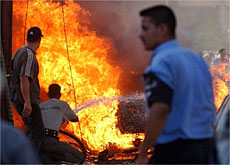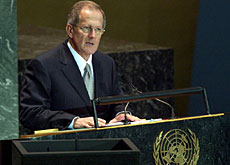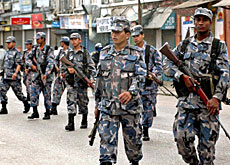Swiss pull development aid official out of Baghdad

The Swiss authorities have temporarily moved their development aid coordinator in Iraq, Daniel Beyeler, from Baghdad to the Jordanian capital, Amman.
In an interview with swissinfo, Beyeler said the decision to leave the country had been prompted by the deteriorating security situation in the Iraqi capital.
Militant groups in Iraq have seized more than 100 hostages since April. Most have been released, but about 30 have been killed.
Beyeler arrived in Baghdad last year to monitor and coordinate aid projects funded by the Swiss Agency for Development and Cooperation (SDC).
He said the SDC’s bureau in Iraq would remain open and that he was in regular contact with the agency’s two local employees.
The head of the Swiss mission in Baghdad, Martin Aeschbacher, will continue to work from the Iraqi capital.
swissinfo: Why did you decide to move to Jordan?
Daniel Beyeler: Above all, it was for security reasons. The situation is not stable enough in Iraq. If you work in humanitarian aid, you have to move around a lot. And this means you could be a target.
We also wanted to ensure the safety of our partners and employees. We are concerned that if we walk around with them we will be putting them in danger, and that is not our aim.
swissinfo: Did you feel personally threatened while you were in Baghdad?
D.B.: No, not at all. The decision to work from Jordan is really a precautionary measure. But there is no threat against Switzerland, the SDC or myself.
swissinfo: What sort of concerns did you have while working in the Iraqi capital?
D.B.: Anything from a car bomb going off as you walk by to simply being in the wrong place at the wrong time. There are so many opportunities for armed groups to act, and they don’t always distinguish between countries. That’s why we decided to take this precautionary measure.
swissinfo: Did the spate of hostage-takings and kidnappings in Iraq play any role in your decision to move to Jordan?
D.B.: Not really. My biggest concern was the security of our employees and partners in Iraq. If I am not around, my two Iraqi colleagues can travel [more] easily. But if I’m with them, they are seen to be working with foreigners, and that could make them a target. Our aim is to support Iraq, so if I endanger our partners, we are not offering any real support.
The general [security] situation has deteriorated drastically over the past few weeks. But as soon as the situation improves, I will be back in Baghdad.
swissinfo: How has the security situation affected Swiss-funded aid projects in Iraq?
D.B.: Well, one project involving the construction of two schools for 1,000 children was delayed because of the threat of shooting at a nearby police station. Our contractor had to stop work for three weeks, but everything is now back on track. Fortunately, we haven’t had problems with our other projects.
swissinfo: Do you think things are going to get worse before they get better?
D.B.: Things have got worse because of the kidnappings, attacks against the coalition forces and the suicide bombings. The chances are that the security situation will deteriorate still further… ahead of the Iraqi elections [planned for January].
Of course, we are hoping that the situation will cool down so that we can get on with our projects. But it’s difficult to say what will happen, so we are having to take things day by day.
swissinfo-interview: Scott Capper
The SDC originally intended to allocate around SFr4.5 million ($3.6 million) a year for its projects in Iraq in 2003 and 2004.
This amount was later increased to SFr8.1 million in 2003 and to SFr8.3 million in 2004.
Projects funded by the SDC are helping to provide clean drinking water, humanitarian aid and reconstruction.

In compliance with the JTI standards
More: SWI swissinfo.ch certified by the Journalism Trust Initiative










You can find an overview of ongoing debates with our journalists here . Please join us!
If you want to start a conversation about a topic raised in this article or want to report factual errors, email us at english@swissinfo.ch.